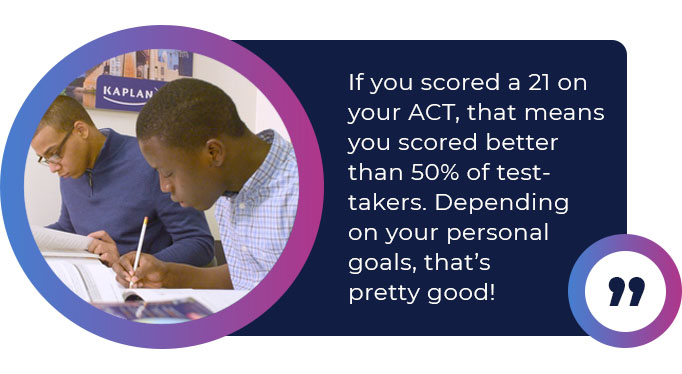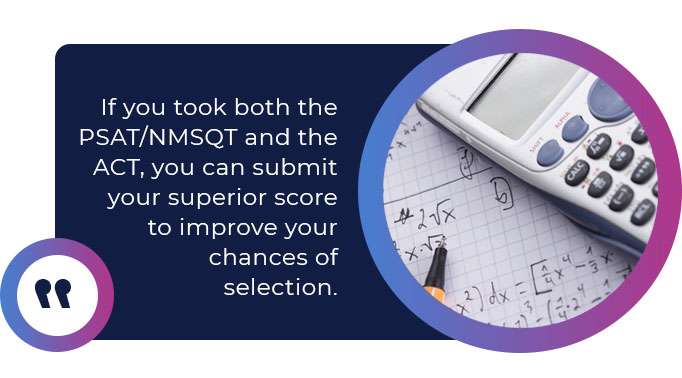After several long months of studying for your college entrance exams, your ACT score is finally back. The moment of truth is here. So, did you totally crush your ACT? Or do you need to pick up the No. 2 pencil again?
Honestly, it can be difficult to know how to react to your ACT score. You probably know that getting a high score can lead to more college scholarships and a better chance at snagging a spot at a good school. But what is a good ACT score in the first place?
When it comes to ACT scores, “good” is a pretty relative term. What may be considered a good score for one student may not be good enough for another student trying to get into a top 20 school. But don’t stress! Tallo is here to break down the numbers and help you figure out what a good ACT score is for your personal goals.
How Is the ACT Scored?
The ACT has four multiple choice sections: Math, Science, English, and Reading. Your correct scores are counted on each section (note: there are no points taken off for incorrect answers) and are then converted to a number falling within a range of 1-36. Your ACT composite score is the average of all four of your scores on each subject test, rounded to the nearest whole number.
For example:
- English: 20.3
- Math: 20.7
- Reading: 21.4
- Science: 21.0
- Total ACT Composite Score: 21
Why is your ACT composite score important? Apart from helping you score that sweet, sweet scholarship money, your composite ACT score is critical because it relates to your percentile ranking.
Your percentile ranking tells you where your ACT score stands in comparison to other test-takers who could be trying to get into the same school as you. For instance, if you’re in the 75 percentile, that means you scored equal to or better than 75 percent of other test-takers.
So, What Is a Good ACT Score?
Obviously, scoring a perfect 36 for your ACT composite score is absolutely amazing. Indeed, only a couple thousand students manage to achieve this incredible feat on any given year.
In reality, most test-takers will fall smack-dab in the middle of the scale. According to the ACT’s annual report, The Condition of College and Career Readiness 2019, the national average ACT composite score was 20.7. This is down slightly from 20.8 in 2018.
So, if you scored a 21 on your ACT, that means you scored better than 50 percent of test-takers. Depending on your personal goals, that’s pretty good! A 35 or above would place you in the 99th percentile, which is obviously an incredible score no matter what your personal goals are.
What Is a Good ACT Score for College Admissions?
The short answer? Anything above average (21 or higher) will get you into smaller colleges and universities, while more selective schools typically require a 25 or above.
Thankfully, most colleges and universities publish school-specific percentile data, so you can easily see how you compare to other students. This information is invaluable because it can help you determine a target ACT score that will improve your chances of getting into your chosen school.
However, keep in mind that ACT scores aren’t the only thing a school takes into consideration for admissions. Depending on the school, you may still have a chance of getting in with a low ACT score.
Bottom line? Don’t count yourself out too quickly!
What Is a Good ACT Score for Scholarship Money?
Another reason you want a “good” ACT score is because it could mean more scholarship money. Merit-based scholarships (which are based on academic standing) may require you to list your ACT score. Didn’t get the high score you had hoped for? Don’t sweat it. Many organizations, including right here at Tallo don’t require you to list your ACT score in your scholarship application.
APPLY FOR TALLO EASY SCHOLARSHIP
But let’s say that you did end up crushing the ACT. Should you include it in your scholarship application? You may want to consider including it, especially if your score is well above the norm.Also, note that semifinalists of the National Merit Scholarship Program can now submit their ACT test scores to qualify for finalist standing. So, if you took both the PSAT/NMSQT and the ACT and did much better on the latter, you can submit your superior score to improve your chances of selection.
The Takeaway
So, to recap, what is a good ACT score? It all depends on your choice of school. Your best bet is to check the school’s percentile data to see where you stack up. Scoring in the 75th percentile of any school will give you a solid chance at being admitted, so long as you meet the school’s additional requirements. Even if your chances of getting into the school are exceptional, it doesn’t hurt to take the test again to maximize your chances of scoring merit-based scholarships. Free money is free money!









